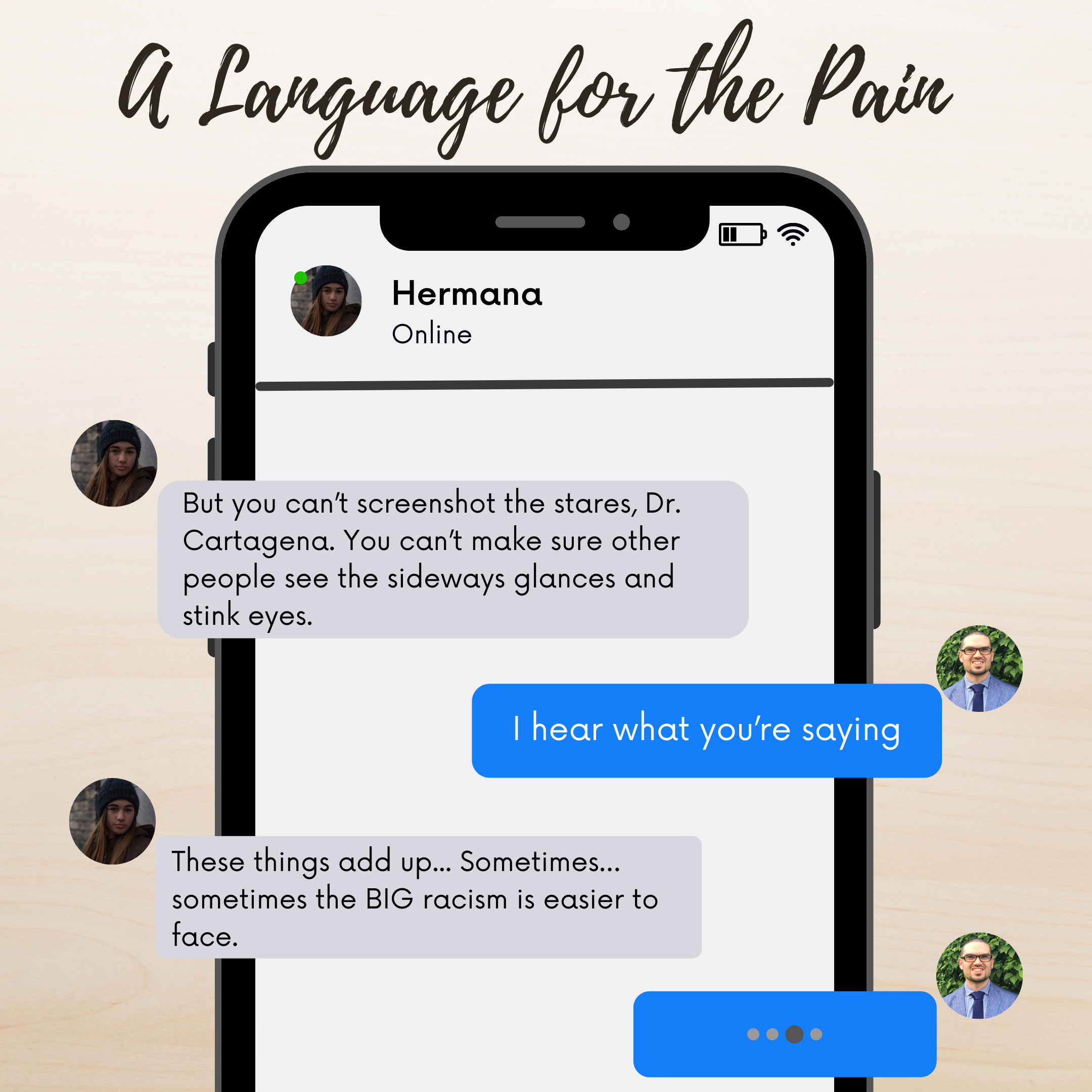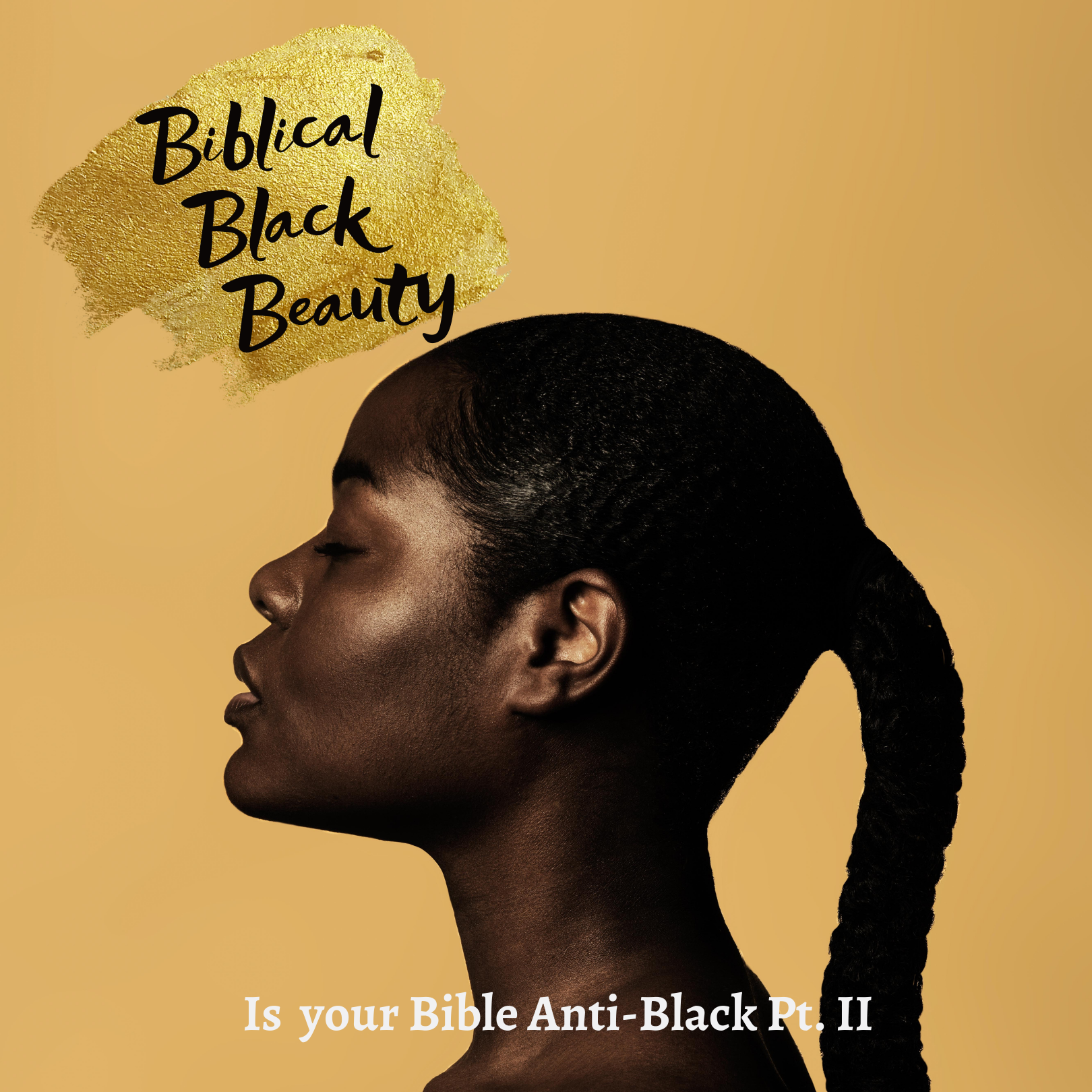To borrow a line from Willie James Jennings, “The things I tell are precise accounts while being exact fabrications…everything I tell you, everything, is the truth. It is the truth in service of moving us to a new place of gathering.”
Mi Amiga
Her lowered head spoke as we sat in silence. So did her hands busily crumpling a napkin from lunch. I listened to mi amiga’s body language while she gathered her thoughts and braced to share her pain.
“This place is wearing on me, Professor Cartagena. I don’t know how much I can take. Some days I feel like I’m gonna loose it…like I’m going to explode.”
Mi amiga was silent for a moment. Her brown hands continued to work on the napkin.
“I can handle the big things—the in-your-face racism or sexism. They’re terrible, but they’re so big that people can’t pretend they didn’t happen, can’t pretend that you’re making something up. Does that make sense, Professor Cartagena?”
“It does, hermana. It does. I hear what you’re saying.”
“When students taped ‘Beaner’ posters on my dorm door, there was no hiding it, no denying it. When they dumped dried beans into my laundry, it was clear that they’d been racist and had violated my privacy and my roommate’s privacy—I mean, they went into our room and put the beans in my clothes hamper! And when white students post racist or sexist things about me on social media, my friends and I can take pictures. We have the evidence!”
After briefly raising her head to look me in the eyes, mi amiga again gazed at the ground. Her napkin resembled a powder. The evidence of its existence was nearly gone.
“But you can’t screenshot the stares, Dr. Cartagena. You can’t make sure other people see the sideways glances and stink eyes. You can’t pause the question, ‘How did you get into this school?’ to make sure other people hear it. You can’t rewind and play the ‘You know we can date and mess around but can’t marry, right?’ question white males ask you to prove that they’re trying to exploit your ‘exotic’ body and sexuality. You can’t prove that these things happen. You don’t have the evidence, just your memory. And the pain…It’s so isolating, Professor Cartagena. And it adds up. These things add up. They take a toll on you, on your body and your mental health. Sometimes…sometimes the big racism is easier to face.”
A Language for the Pain: Microaggressions
Mi amiga was suffering. She’d experienced neon-light racism, the kind that makes skeptics about racism’s existence confident that, here, at last, is an instance of racism that they may, nay, must denounce. But if we listen to her words and her body, this form of racism wasn’t the greatest source of her pain. Something else had taken a toll, and still was.
What caused my friend to lower her head? What prompted her to dismantle a napkin? What overwhelmed her? What made her feel like she might explode? Stares, sideways glances, stink eyes, racist questions about ability, racist questions about gendered sexual exploitation—these were the culprits.
Race scholars call these culprits microaggressions. Harvard psychiatrist Chester Pierce introduced the term “microaggression” in his essay “Offensive Mechanisms” (1970). Reflecting on abusive behavior, Pierce writes:
Most offensive actions are not gross and crippling. They are subtle and stunning. The enormity of the complications they cause can be appreciated only when one considers that these subtle blows are delivered incessantly. Even though any single negotiation of offense can be considered of itself to be relatively innocuous, the cumulative effect to the victim and to the victimizer is of an unimaginable magnitude. Hence, the therapist is obliged to pose the idea that offensive mechanisms are usually a micro-aggression.
Pierce acknowledges that some abusive actions are glaringly gross and large scale. They include the neon-light racism and sexism mi amiga suffered. But not all abusive actions are this glaring or large. As Pierce notes, most aren’t. Instead, they are smaller slights and put-downs some people receive every day. Moreover, the cumulative effect of these smaller scale injustices takes a toll on victim and victimizer alike, leaving both bowed under these evils’ compounded weight.
In this and later work, Pierce develops the concept of microaggressions to account for subtle, quotidian forms of racism. He argues that antiracists “must not look for the gross and obvious [forms of racism]. The subtle, cumulative mini-assault is the substance of today’s racism.” Thus, Pierce encourages antiracists to look for the stares, sideways glances, stink eyes, and racist questions mi amiga suffered. He contends that “the relentless omnipresence of these noxious stimuli” fill the U.S.’s social fabric. “These cumulative, minor but incessant put-downs often remain psychopollutants in the social environment,” Pierce writes, “[and] their lingering intractability is a major contributor to the continuing traumatic stress” racialized minorities suffer individually and communally.
A Language for the Pain: Racial Battle Fatigue
Building upon Pierce’s work, race scholars such as William Smith study the toll that racial microaggressions enact upon racialized minorities like mi amiga. Within an interdisciplinary framework called “racial battle fatigue,” Smith and fellow investigators examined how the cumulative stress of microaggressions impacts Latin@s and Black Males in historically and predominately white schools. The following chart details the cause and stress responses they uncovered.
Smith, William A., et al. “Racial Battle Fatigue and the MisEducation of Black Men: Racial Microaggressions, Societal Problems, and Environmental Stress.” The Journal of Negro Education, vol. 80, no. 1, 2011, pp. 63–82.
Microaggressions cause physiological, psychological, and behavioral stress responses in racialized minorities. The twenty physiologically responses Smith records include headaches, hives, intestinal problems, and insomnia. Similarly, the sixteen psychological responses range from irritability to hopelessness. And the seventeen behavioral responses vary from overeating to procrastination.
In subsequent conversations, mi amiga mentioned suffering from headaches and insomnia. She told me that she struggled with frustration and feelings of helplessness. And wondered aloud why she’d grown impatient and struggled to do easy class assignments.
“Professor Cartagena, I feel like I’m falling apart. What’s wrong with me?”
“You’ve suffered greatly, hermana. And your body has kept the score.”
Returning to Mi Amiga
Each time I spoke with mi amiga, a passage from James Baldwin’s “Uses of the Blues” came to mind. Reflecting on Black suffering, Baldwin writes:
You’ve seen these black men and women, these boys and girls; you’ve seen them on the streets. But I know what happened to them at the factory, at work, at home, on the subway, what they go through in a day, and the way they sort of ride with it. And it’s very, very tricky. It’s kind of a fantastic tightrope.…And I know that some improbable Wednesday, for no reason whatever, the elevator man or the doorman, the policeman or the landlord, or some little boy from the Bronx will say something, and it will be the wrong day to say it, the wrong moment to have it said to me; and God knows what will happen. I have seen it all, I have seen that much.
When mi amiga said, “Some days I feel like I’m gonna loose it…like I’m going to explode,” I thought, “I know what happened to you. I know what happened to me. I know what we go through in a day.” But I didn’t share these thoughts with her. I didn’t even recommend that she read Baldwin—at least not yet. Instead, I shared the words “microaggression” and “racial battle fatigue.” I offered her language that illuminated reality and empowered her to name her experience. Naming the causes of our festering wounds is an important step toward our healing.
About Dr. Nathan Luis Cartagena
A son of the US South (Mom) and Puerto Rico (Dad), Dr. Cartagena is an Assistant Professor of Philosophy at Wheaton College (IL), where he teaches courses on race, justice, and political philosophy, and is a fellow in The Wheaton Center for Early Christian Studies. He serves as the faculty advisor for Unidad Cristiana, a student group working to enhance Christian unity and celebrate Latina/o cultures, a scholar-in-residence for World Outspoken, and a co-host for the forthcoming podcast From the Underside. He’s also writing a book on Critical Race Theory with IVP Academic.
Articles like this one are made possible by the support of readers like you.
Donate today and help us continue to produce resources for the mestizo church.












